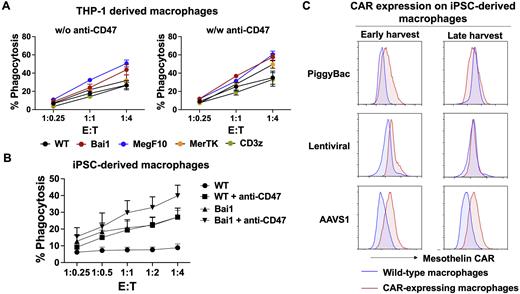Abstract
Expression of chimeric antigen receptors (CARs) provides an important strategy to improve the anti-tumor activity of immune cells. T cells equipped with CARs specific to tumor antigens have been very effective for treatment of B cell malignancies. However, CAR-T cell-mediated treatment had limited success in solid tumors. Since macrophages are capable of infiltrating into tumor microenvironment, detecting phagocytic targets and engulfing them, as well as stimulating other endogenous immune cells, macrophages engineered with CAR constructs have been gaining interest for cancer immunotherapy.
We have successfully generated CAR-expressing induced pluripotent stem cells (iPSCs) through either PiggyBac transposon-mediated transfection or lentiviral transduction. Subsequently, the CAR-expressing iPSCs were differentiated into macrophages (iPSC-CARMACs). The CAR expression in undifferentiated iPSCs were high and stable, but gradually downregulated during the differentiation into macrophages. Due to the loss of CAR expression, these iPSC-CARMACs only modestly improved phagocytic activity compared to wild-type iPSC-derived macrophages (iPSC-MACs) in vitro. Additionally, we did not find a significant benefit for in vivo anti-tumor activity of the iPSC-CARMACs compared to iPSC-MACs. We hypothesized the deficiency of anti-tumor activity might be due to the loss of CAR-expression that can become silenced after random integration into the genome. Therefore, to test this hypothesis as well as improve and stabilize the CAR expression, we engineered human iPSCs using CRISPR-Cas9 mediated CAR insertion into AAVS1 locus, a known safe harbor locus that is less prone to genetic silencing.
We engineered a series of CAR constructs containing the same anti-Mesothelin (Meso) extracellular single-chain antibody variable fragment, combined with different intracellular signaling domains including Bai1, MegF10, MerTK and CD3ζ. To determine the phagocytic activity of the anti-Meso CARs expressing these different intracellular domains, we initially introduced CAR constructs into THP-1 cells. We tested these CAR-expressing THP-1-derived macrophages in phagocytosis assay with Meso-expressing A1847 ovarian cancer cells. We found Bai1 and MegF10 triggered higher levels of engulfment of tumor cells than other CAR constructs either by themselves or when combined with anti-CD47 antibody (Figure A).
Given the potential anti-tumor activity of anti-Meso-Bai1 and anti-Meso-MegF10 CARs, we next generated anti-Meso-Bai1 and anti-Meso-MegF10 CAR-expressing iPSC-CARMACs by targeting at AAVS1 locus to improve CAR expression compared to the previous iPSC-CARMACs made by transposon transfection or lentiviral transduction. We successfully obtained iPSCs expressing anti-Meso-Bai1 CAR integrated into AAVS1 site (AAVS1-Meso-Bai1-iPSCs). We have differentiated the AAVS1-Meso-Bai1-iPSCs to macrophages (Meso-Bai1-CARMACs) and demonstrated Meso-Bai1-CARMACs significantly improved phagocytic activity compared to iPSC-MACs with or without the addition of anti-CD47 antibody (Figure B). Notably, CAR expression was stably maintained at a high level on the mature macrophages generated from the AAVS1-Meso-Bai1 iPSCs compared to those either from transposon or lentiviral vector mediated CAR expressing iPSCs (Figure C). We isolated two homozygous clones of AAVS1-Meso-Bai1 iPSCs that have even stronger CAR expression than bulk population of AAVS1-Meso-Bai1 iPSCs. The differentiation of these single clones, as well as the evaluation of their in vitro activity are in progress. We are also testing the in vivo function of these new AAVS1-iPSC-CARMACs in an ovarian tumor model.
Together, these studies demonstrate that we can successfully produce CAR-expressing iPSC derived macrophages, which exhibit improved anti-tumor activity compared to wild-type iPSC derived macrophages. CAR expression can be best maintained on macrophages by AAVS1-locus targeting insertion. Importantly, these studies also demonstrate that strategies used to genetically modify iPSC-derived cells may need to be modified or optimized depending on which mature cell type of interest is being produced. That is, while randomly integrated CARs seem to work well in iPSC-derived NK cells and T cells, this targeted insertion approach is likely needed for derivation of more functional iPSC-derived CAR-macrophages.
Disclosures
Kaufman:Qihan Biotech: Consultancy; VisiCell: Consultancy; Shoreline Bioscience: Current holder of stock options in a privately-held company, Membership on an entity's Board of Directors or advisory committees, Research Funding.
Author notes
Asterisk with author names denotes non-ASH members.


This feature is available to Subscribers Only
Sign In or Create an Account Close Modal